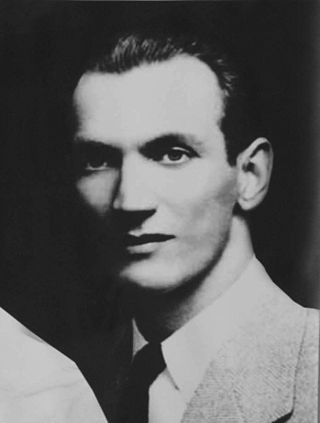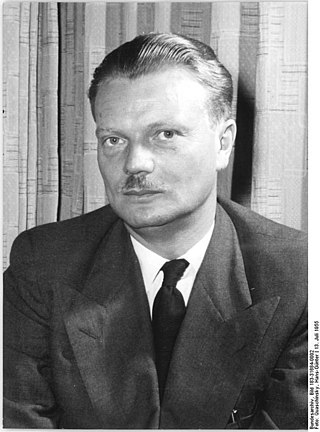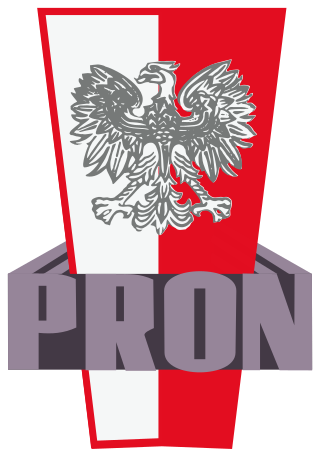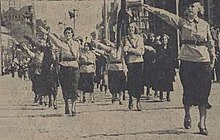
Jan Karski was a Polish soldier, resistance-fighter, and diplomat during World War II. He is known for having acted as a courier in 1940–1943 to the Polish government-in-exile and to Poland's Western Allies about the situation in German-occupied Poland. He reported about the state of Poland, its many competing resistance factions, and also about Germany's destruction of the Warsaw Ghetto and its operation of extermination camps on Polish soil that were murdering Jews, Poles, and others.
Sanation was a Polish political movement that was created in the interwar period, prior to Józef Piłsudski's May 1926 Coup d'État, and came to power in the wake of that coup. In 1928 its political activists would go on to form the Nonpartisan Bloc for Cooperation with the Government (BBWR).
National Democracy was a Polish political movement active from the second half of the 19th century under the foreign partitions of the country until the end of the Second Polish Republic. It ceased to exist after the German–Soviet invasion of Poland of 1939.

Elections to the European Parliament were held in Poland on 13 June 2004. 20.87% of eligible citizens voted; of these, 97.33% of the votes cast were valid. The elections resulted in a heavy defeat for the governing Alliance of the Democratic Left and Labor Union parties, although the very low turnout makes a direct comparison with national election results difficult. As expected the most successful party was the Civic Platform. Second place was taken by the strongly anti-EU League of Polish Families.

Tadeusz Mazowiecki was a Polish author, journalist, philanthropist and politician, formerly one of the leaders of the Solidarity movement, and the first non-communist Polish prime minister since 1946, having held the post from 1989 to 1991.
Jędrzej Giertych was a Polish right-wing politician, journalist and writer.
The Alliance of Democrats is a Polish centre-left party. Initially formed in 1937, the party underwent a revival in 2009, when it was joined by liberal politician Paweł Piskorski, formerly a member of the Civic Platform.

The Holy Cross Mountains Brigade was a controversial tactical unit of the Polish National Armed Forces established on 11 August 1944. It did not obey orders to merge with the Home Army in 1944 and was a part of the Military Organization Lizard Union faction, related to the National Radical Camp political party. Its soldiers fought simultaneously with the Nazi Germany, the Soviet Union and the Polish communist underground, though it sometimes collaborated with the Nazis to further its anti-communist, anti-Jewish and totalitarian goals.

In Poland, the resistance movement during World War II was led by the Home Army. The Polish resistance is notable among others for disrupting German supply lines to the Eastern Front, and providing intelligence reports to the British intelligence agencies. It was a part of the Polish Underground State.

Bolesław Bogdan Piasecki, alias Leon Całka, Wojciech z Królewca, Sablewski was a Polish writer, politician and political theorist. During the war, he was active in the anti-German and anti-Soviet armed underground. Initially of national radical views, he became associated after the war with the ruling Polish communists and led a group of lay Catholics who collaborated with the communist regime.
With the fall of communism Polish culture and society began a process of profound transformation, marked by the return of democracy and redevelopment of civil society. After 1989, the heavy government controls ended, and the radical economic changes were introduced. The influx of new aesthetic and social ideas was accompanied by the Western market forces. However, unlike any other temporal marker in the development of Polish culture from the past, the year 1989 did not introduce any specific literary events or artistic manifestations. For a generation of accomplished writers the objectives and their moral quests remained the same as in the preceding period. The first decade of freedom brought mainly state reforms in the financing of cultural institutions and patronage; forcing self-sustainability in an often uncharted territory. Literature, film, visual arts, theater and mass media remained focused on their active participation in public life.

Stanisław Głąbiński was a Polish politician, academic, lawyer and writer.

Left and Democrats was a centre-left electoral alliance of political parties in Poland which was created on 3 September 2006, before the Warsaw municipal election of 2006. The coalition's aim was to provide an alternative for both Law and Justice and Civic Platform, which have been Poland's two major political parties since 2005. LiD contested their first national election in October, 2007 and won 53 seats to the Polish parliament, the Sejm. The LiD alliance was dissolved in April 2008, following a rift between the member parties.

Patriotyczny Ruch Odrodzenia Narodowego was a Polish popular front that ruled the Polish People's Republic. It was created in the aftermath of the martial law in Poland (1982). Gathering various pro-communist and pro-government organizations, it was attempted to show unity and support for the government and the Polish United Workers' Party (PZPR). PRON was created in July 1982 and dissolved in November 1989.
The Chopin University of Music is a musical conservatorium and academy located in central Warsaw, Poland. It is the oldest and largest music school in Poland, and one of the largest in Europe.

The National Party was a political party in Poland which was reactivated in 1989 in Warsaw by Jan Ostoja Matłachowski, Leon Mirecki, Maciej Giertych, Bogusław Jeznach, Bogusław Rybicki and others as the successor to the pre-war National Party. Its first chairman was Stefan Jarzębski. The re-activated SN was officially registered on 21 August 1990.

Karol Polakiewicz was a Polish lawyer and politician of various parties including PSL - Piast, the Peasant Party, BBWR and OZN, a captain in the Polish Army and a freemason.
Zygmunt Felczak was a Polish politician. He was a member of the State National Council and a deputy governor of Pomerania. As an activist of the National Workers' Party and the Labour Faction, he founded the daily paper "Ilustrowany Kurier Polski" and took part in the Warsaw uprising.














